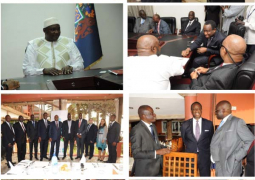A two-day sub-regional Islamic scholars dialogue to end female genital mutilation, FGM, organised and hosted by Gamcotrap in collaboration with Save the Children is under way in Banjul.
The forum is geared towards engaging religious leaders in the struggle to end FGM, drew participants from various countries.
Held at the Paradise Suites Hotel, the forum was designed to provide the participants the opportunity to sit and discuss, and share their experiences on issues affecting the girl-child, in order to come to a consensus. It also gave the organisers the chance to clarify misconceptions about FGM and Islam in The Gambia.
Dr Isatou Touray, executive director of Gamcotrap, said the event was sponsored by Save The Children, one of Gamcotrap’s longstanding partners in the fight against harmful traditional practices, such as FGM and early marriage.
Save The Children has been involved in the protection of children for many years, Dr. Touray added, and thanked it’s partner for creating a protective environment for the children of The Gambia.
Dr Touray noted that the funding of the event was in response to recommendations and suggestions made by people to work towards a final decision regarding FGM and Islam.
“We are here because of the popular demand of the polity in addressing the misconceptions on the relationship between FGM and Islam, and to put the protracted debate on this subject matter to end in an attempt to facilitate legislation against its practices,” she said.
According to the executive director, the overall goal of this regional dialogue was to put an end to the misconception about FGM and Islam.
This interface with scholars from the different regions namely, Guinea, Mauritania and The Gambia, aims to exhaust the various religious arguments while shedding light on common misconceptions, she stated.
At the same time, she went on, they would also learn about the effects of FGM on women and children’s sexual and reproductive health rights.
She said that based on this, and in order to gain knowledge and strategies from other Muslim majority countries that have legislated against FGM, they must create a dialogue that would dissociate FGM from Islam.
Dr Touray further said that a lot had been achieved in the Gambia with regard to advocacy to end FGM.
“I am happy to inform the participants that since 2007 to date 128 circumcisers and 900 communities have abandoned the knife and are protecting their girl-child,” she disclosed.
Speakers at the ceremony included Fatou Kinteh of UNFPA, Neneh Touray representing the executive director of the Women’s Bureau, the director of Save the Children West and Central Africa, the governor of West Coast Region, and Mauritania’s ambassador to The Gambia.


